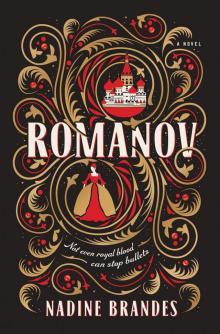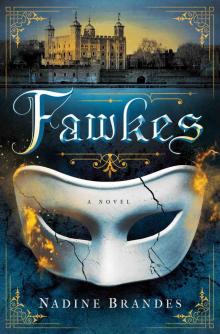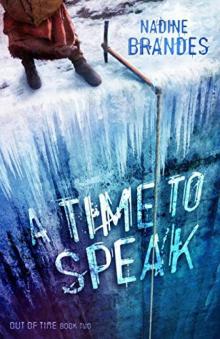- Home
- Nadine Brandes
Romanov Page 5
Romanov Read online
Page 5
The Bolsheviks shoved us into the droshkies. Most of the carriages were open with one long bench seat for passengers, but Alexei, Olga, Tatiana, and I were put in a covered droshky. Zash climbed in with us. I had not interacted with him on the train since he’d been in a different compartment.
He didn’t have his pack with him. Did it still hold the spell ink?
Before the door closed, I saw only Dr. Botkin and Kharitonov through the downpour, climbing into an open droshky of their own. Nagorny got two steps out of the train carriage, his hand raised in a farewell, before a Bolshevik shoved him out of sight.
“Wait, what of our other servants? Our friends?” I asked.
“They’re not joining you.” Zash didn’t meet our eyes.
“What?” Alexei lurched toward the window. “Wait! May we say farewell?”
The droshky trundled forward and Zash shut the door. “I am sorry.” As though to cement the situation, he pulled the drapes shut.
Five sets of lungs released quickened breaths, mixing in the tiny space. I couldn’t bring myself to inhale again. There was no air. There was no light. I gripped the curtain fabric with a shuddering breath like a lifeline, pulling it to let in a stream of dim light, but Zash grabbed my fist with his own.
He was gentle but firm, prying my fingers off. “It is for your safety.”
“Since when do Bolsheviks care about our safety?”
He straightened the curtain. “Since our commandant ordered us to. Ekaterinburg is not pleased to have you. It is best if you are not seen by any other locals. It could incite a lynching.”
I pressed back into the old cushions of the carriage seat and closed my eyes. In Tobolsk the people had brought us gifts and smiles and hope. But Ekaterinburg was all Bolsheviks and revolutionaries.
Alexei slipped his hand into mine. I wanted to press it to my heart, but he needed assurance as well as I. “How long to our new lodging?” How long to Papa? Maria? Mamma?
“I expect it is half an hour to the Ipatiev House.”
“Who is Ipatiev?”
Zash shrugged. “The man who owned the house before the Ekaterinburg Soviet claimed it for your exile.”
How typical of the Bolsheviks to steal a person’s home for their purposes.
The half hour was the longest of my life. With no light and no fresh air, I felt buried. Alexei’s breathing quickened like a young bird’s. He hadn’t handled the journey well, physically. Emotionally, however, he’d maintained a soldier’s resolve. Mamma would be heartbroken to see his frail state. But soon he would be in a bed and a stable place . . . for as long as the Bolsheviks would allow us to stay.
To live.
I pressed a hand to the Matryoshka doll still shoved in my jewel-lined corset. We would survive. I had the key.
Zash peeked out of the curtains and then drew one open. The splash of light splitting the storm clouds rebounded off the snow and stung my eyes, but I gulped it in. “Here it is.” He pointed.
The carriage passed through a palisade of sawed timber and telegraph poles, about twelve feet in height. The white stucco walls of the Ipatiev House, with carved doors and window frames, were classic Russian style. It was significantly smaller than the governor’s house in Tobolsk. Linden trees shaded parts of the house and street, but a stiff rotation of guards tainted its natural loveliness.
We rolled to the entrance at 49 Voznesensky Prospekt. The heavy wooden courtyard doors slammed shut behind us. We had entered a fortress.
No one rushed out of the house to greet us. Instead, Zash led us in one at a time. First Olga went, then Tatiana, then it was my turn. Zash held open the door and took my upper arm to “lead” me into the house whether or not I wanted it. I would have dragged him behind me in my haste had I the strength.
We entered through a sentry of guards and then the door. Despite the chill outside, the house brought an immediate stuffiness. It seemed too dark, and I couldn’t place the reason until I passed a window. I couldn’t see out—the glass had been whitewashed.
A Bolshevik soldier patted me down. He was extremely thorough but avoided the bosom area, as was appropriate. Ah, the power of being a woman.
He straightened and looked me in the eye. “We received a telegram that you stole a magical item from Commandant Yurovsky in Tobolsk.”
My jaw dropped as my tired and cold mind scrambled for a response. “Stole? Magical item? I don’t know what he’s talking about. I found one of my babushka’s dolls with his belongings. It was sentimental to me.”
“What happened to it?”
I thrust emotion into my voice. “The guards took it away when I was on the train.”
“Which guard?”
“How should I know? One dressed as a Bolshevik.”
His mouth thinned. “Your belongings will be searched thoroughly.”
I swallowed. Nodded. Compliant. “Of course. Do what you must.” Would they search the soldiers’ packs? Zash’s?
He shoved me onward and relief poured through my aching bones. Yurovsky had telegrammed. He knew. But did he know what the doll held? Even I didn’t know.
I never should have winked at him.
I stumbled up a set of narrow stairs, across a landing that smelled strongly of body odor, and finally entered a sitting room filled with voices. I saw first more whitewashed windows and how they made the house feel full of steam. Then a mahogany piano, a writing desk, and landscape art hanging on the papered walls.
Finally, I saw Papa.
He stepped out of an embrace with Tatiana and stood taller at the sight of me. I stumbled to him, flinging myself into his strong arms. He held me so tight, so securely, I felt as though I would never despair again.
“My little shvibzik,” he muttered. I planted kisses all over his face—on his brow, his cheeks, his prickly mustache. My sweet, sweet papa.
Another set of arms embraced me and I moved to Mamma. I’d barely kissed her cheek when a squeal sent a burly bundle of delight crashing into me.
“Maria!” I exclaimed.
She felt thinner than three weeks ago, but her face glowed with joy. She grabbed both my hands and hopped up and down. “They told us only a couple hours ago that you were arriving! Oh, Nastya, what a time it has been.”
Her face transformed from joy to weeping in seconds. This must have been terrible for her. To be trapped in this painted house with high walls around it, not knowing we were coming. Why did the Bolsheviks not tell them sooner? Didn’t she receive my letter?
Alexei came in last, walking on his own with a disjointed, stumbling gait. He looked ready to fall at any moment. Papa strode across the room and swept his son into his arms. He embraced Alexei gently. Mamma hurried over, muttering, “Oh, my sweet boy.”
Neither mentioned how much smaller he’d gotten since they last saw him.
“I wanted to walk in by my own strength,” Alexei mumbled.
“Of course,” Papa said.
And here we were, together again. A family ready to face whatever the Bolsheviks deemed “exile.”
A middle-aged man with fair hair and a tiny mustache entered the room. He swayed a bit on his feet and wore a cavalry sword at his side. “I’m Commannnnant Avdeev.” Definitely tipsy.
So this was our new authority . . . and the new target of my mischief.
He showed us our quarters. There wasn’t much to see. Our group consisted only of my family, Dr. Botkin, Anna the maid, Trupp the manservant, and Kharitonov the cook. Our friends, committed to exile with us. Trupp brought Alexei’s spaniel and Tatiana’s two dogs. After his entrance, the house was closed up, but nothing could stop up our delight in reunion.
Our small crew of people and pups was confined to five interconnecting rooms with a bathroom on the landing and a small kitchen at the far end. The staircase was shut off by a locked doorway. We’d never been enclosed in quarters this small. Surely they didn’t mean for us to stay in these five rooms throughout the days.
Avdeev left us to settle in, b
ut we soon heard that he sent away all the kind, loyal soldiers who had been left on the train. Back to Tobolsk? To prison? We didn’t know.
The Bolsheviks from Tobolsk stayed, joining those already at the Ipatiev House. They all seemed angry with us.
Commandant Avdeev and his aides had access to our rooms any time they desired. Had Avdeev entered at that moment, he would have found us all gathered in the sitting room, kneeling together beneath the electric Italian glass chandelier with Papa leading us in prayer. More tears came from our eyes than words from our mouths. Papa always said that tears were the most fervent prayers, so I let them flow.
“We must show kindness to the soldiers,” Papa entreated us. “Every day, show them forgiveness. We are a reflection of Iisus, and he was rejected by his own people just as we are. Love. Forgive.” He kissed each of us on the forehead.
I was determined to be as he asked. To be humble. To be forgiving. To always hold to hope. We bid each other good night.
Papa carried Alexei to the small room designated for him toward the back of the house. It was a luxury in this tight space, yet I suspected Alexei did not wish to sleep alone just as I didn’t. Through the open doorway, he looked over Papa’s shoulder back at me. I forced a brave smile.
“I will dress on my own,” Alexei announced to Papa.
Papa nodded and set him on his feet to change into sleeping clothes. Alexei was determined to prove he was healing and he was strong. But as he climbed into his bed, his socked foot slipped and he landed hard on his knee against the wood floor. He gasped at the impact and I was the first at his side. “Oh, Alexei.”
He’d surely bruised it, and his hemophilia would keep that blood in his joints, sending pain for weeks. It would swell and keep him from walking.
Papa and I lifted him into his bed. Alexei grimaced and Mamma was in the room within seconds, fluffing his pillow. She swept me aside and Alexei gripped her hand. I left them alone. I let her care for him.
My sisters and I were to share a room. Not much furniture filled the space—a simple table, some chairs, and a looking glass on a stand. I rather liked the light floral wallpaper decorating the space. One could imagine we were stepping into a garden.
An oriental rug covered most of the linoleum flooring, upon which Olga, Tatiana, and Maria had created a pile of coats and blankets since our portable camp beds had not yet arrived from Tobolsk. I tucked myself into the nest, craving the press of their bodies and the security of family.
All night, I heard Alexei’s moans of pain.
All night, Mamma stayed awake and held his hand.
All night, I cried.
I knew Iisus’ heart heard me. And I was certain the fervency of my tear-prayers would surely break it.
5
May 24
Everyone woke at sunrise—not because we were rested and certainly not from the sun shining, for it couldn’t penetrate the whitewash. We woke because we were together again. It was better than any birthday or Easter morning. We also knew that rhythm was a fierce weapon against despair.
Alexei stayed in bed, his knee already swollen to twice its size. Dr. Botkin bent over him with his tiny satchel of medicines. They wouldn’t be enough. He needed healing spells. But Alexei’s joy at being with Mamma and Papa again provided a small balm for his suffering.
This morning my mind was no longer in despair. Instead, my thoughts lingered on the bruise against my sternum. The press of a figure-eight piece of wood I’d kept on my person since Tobolsk.
I hurried into the main room where Papa sat in a chair beside a large potted palm, reading a newspaper. “Dobroye utra, Papa.” Oh, how nice it was to say that again.
He flopped a corner of the paper down. “Good morning, Nastya.” I kissed his cheek and then took a breath to speak, but Papa spoke first. Swiftly. “You should spend the day with Maria. She has missed you dreadfully.”
I closed my mouth, reading his dismissal. His warning. Then I noticed the doors to the landing—and to Commandant Avdeev’s office—were propped open. I picked up the hint and joined in so no pauses in conversation would implicate me. “Of course! I’ve missed her, too.”
If I singled out Papa on the first day, that would rouse suspicion. Papa had been here for a month, which meant he had spent that time reading the soldiers and the commandant. He would let me know when it was safe to speak with him alone. I was much more used to the long corridors and private spaces in Tobolsk.
I needed to forget everything I knew. Everything I’d been accustomed to.
This was different. This was exile.
But the doll burned against my skin. I wanted to know when to use it. What it meant. What it contained. I wanted answers. Knowledge. But Papa asked for my patience without speaking a word. So I spent the day with Maria.
We breakfasted in the dining room, easily the nicest room in our quarters with enormous oak doors opening to a parquet floor and a room filled with dark, heavy furniture upholstered in leather. Maria practically pasted herself to my side. When I’d been stuck in Tobolsk, at least I had the companionship of my siblings. But poor Maria had no friends with her when she came to Ekaterinburg.
We were allowed outside after lunch, and we practically fled the house into the fresh air. Considering we had grown up more outdoors than indoors—boating, foraging, gardening—the Ipatiev House felt like a stifling box. And this was only the first day.
“I don’t know how I shall bear being in that house,” I confided to Maria.
She hooked her arm around mine and we took in the measly garden. It was barely a patch of grass with a few trees. Ninety paces long at most. I tried to be thankful and resisted comparing it to the governor’s house in Tobolsk—which had still paled to the rolling grounds of the Alexander Palace. It had been so long since I’d been at the palace that the idea touched my memory like a different lifetime.
“They painted the windows only a week ago.” Maria set a brisk pace and I matched it. I didn’t know how long the commandant would allow us to remain outside, so we needed to get our exercise in while we could.
“Why?”
“Our arrival was supposed to be a secret, but when we got here there were riots at the station. We had to bypass it and then come to the house via a long road route. Only a couple weeks ago, our presence was announced in the Ural’skiy Rabochiy paper. After that, they painted the windows and increased the guards. I think maybe they’re afraid we’ll signal for help.”
The dogs ran in circles—Tatiana sat on the grass tossing a ball to her two pups. But Alexei’s sweet spaniel would have none of it. Joy sat by the door, wagging her tail in the sunshine and longing for her master.
“Poor Alexei,” Maria murmured as we passed Joy. “If only we could bring sunshine back in to him.”
“As if the guards would allow it. They seem stiffer than their own vodka bottles.” Three Bolsheviks stood out in the garden, watching us. One in particular seemed to follow Maria’s and my path with his gaze. I resisted the urge to check and make sure the Matryoshka doll was secure.
“Not all of them.” A glimmer of sunlight entered Maria’s tone. “They have not been as receptive as the soldiers in Tobolsk, but they are still good men. Papa says they are only trying to serve their country. The problem is, their country has branded us as enemies. That’s not our fault. That’s not the Bolshevik soldiers’ fault.”
I knew what Papa said. But Maria seemed particularly passionate. And when her eyes met those of the guard who watched us so closely, I knew why. Maria had been here a full month. And that soldier had a kind face. She’d found a friend in the only place she could.
Zash entered the garden wearing a freshly washed uniform and a rigid spine. He caught my gaze, but then he spotted the friendly Bolshevik. Zash’s face broke into a wild grin and he spread his arms wide. “Ivan!”
He and Ivan crossed the garden to meet in a firm handshake. How did they know each other? Was Zash from Ekaterinburg?
Maria watched the exchan
ge with a dreamy expression. I nudged her. “Now that you mention it, some of the guards out here seem particularly pleasant to look at.”
Maria sighed. “His name is Ivan.”
His name is Zash, I replied in my head.
Maria sounded weary. The friendships here must not have been easy to build. Nothing was more exhausting than putting forth kindness and receiving indifference in return. I waggled my eyebrows. “Have you broken out your beaded gown yet? That would fell all the Bolsheviks in one swish.”
She lifted her chin in a mock sort of snootiness. “My stunning figure would be too good a death for them.”
I laughed. She laughed. Neither acknowledged the tears that came with it.
“I’ve missed you,” we both said.
The Bolsheviks watched us the way a wolverine stakes out a vole hole. Without blinking. Without softening. This went on for several days. It was said a wolverine could never be tamed. I suspected this was also the case for Bolsheviks.
“It’s likely due to the change in rhythm and increase in guards,” Maria said when I shared my thoughts. “They now have twelve enemies to guard instead of just Papa, Mamma, and me.”
Due to their vigilant supervision, there was never a good time to speak with Papa alone. So I kept the Matryoshka doll solidly beneath my corset and busied myself with other things, like sending the guards kind smiles as Papa encouraged us to do. Like writing letters to friends back home that likely never got mailed. Like playing cards and dominoes with Maria and beating her soundly every time.
I read Alexei story after story, making all the voices and silly faces. I pretended not to notice the grimaces brought on by his swollen knee. We played with his toy soldiers, setting them up as the Red Army Bolsheviks versus the White Army loyalists.
I read my German book on spell mastery cover to cover but never once found info about how to make ink. Every day, Alexei seemed frailer. Dr. Botkin said that Alexei had lost fourteen pounds in the past month. Our current rations were not likely to help him regain that weight. Not for the first time, I snuck a peek at the Matryoshka doll. Nothing had changed. Perhaps I would have to smash it to release the spell.

 Romanov
Romanov Fawkes
Fawkes A Time to Die
A Time to Die A Time to Speak
A Time to Speak